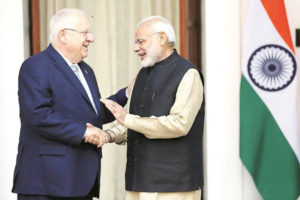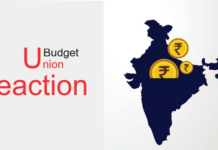
After reaching out to West Asian countries such as the UAE, Saudi Arabia, Iran and Qatar over past two years, Prime Minister Narendra Modi government has now pulled ties with Israel out of the closet. At the bilateral meeting held on Tuesday between the visiting Israeli President Reuven Rivlin and Prime Minister Modi, the two countries decided to intensify cooperation to combat the forces of extremism and radicalisation. The decision came hours before the Union Cabinet decided to ban Islamic preacher Zakir Naik’s organisation Islamic Research Foundation (IRF) for five years, under Unlawful Activity Prevention Act.
Referring to growing collaboration between the two countries, particularly in defence sector, Rivlin, the first Israeli President to visit India in two decades, said his country is ready to “make in India and make with India”. He also asserted that nothing can justify terrorism. “We stand together in defending our people and our values,” he said after the conclusion of bilateral talks.
Soon after Modi assumed office, foreign policy experts had expected him to go overboard to embrace Israel. But he stayed cautious and instead reached out to its Arab neighbours and Tel Aviv’s arch rival Iran. Sources here said the strategy was carefully planned to remain sensitive to the Arab nations, especially at a time the Islamic State terror group was spreading across West Asia. India’s abstention from a vote on a pro-Palestine resolution at the Unesco critical of Israel’s construction within the walled city of Jerusalem in late October, just ahead of Rivlin’s visit, seems second half of his term will see flurry visits of Israeli leaders. Modi’s visit to Israel is also expected now in January 2017 to coincide with the celebrations of 25 years of full diplomatic relations between the two countries. In September 2015, President Pranab Mukherjee visited Israel, but he also travelled to Palestine and Jordan — home to the world’s largest number of Palestinian refugees. In January, External Affairs Minister Sushma Swaraj also visited both Israel and Palestine.
Both sides on Tuesday decided to “broad-base” defence partnership and also a variety of areas, including trade and investment, agriculture, water resources and cyber crime. Giving some details of his talks with the Israeli leader, Modi, in a media statement, said people of both countries were constantly threatened by forces of terrorism and extremism, and both sides agreed to intensify cooperation in combating them effectively, particularly having a “practical and specific” engagement such as in the cyber domain. “We recognise that terrorism is a global challenge, knows no boundaries and has extensive links with other forms of organised crime,” he said.
In an obvious reference to Pakistan, the Prime Minister said, “Regrettably, one of the countries of its (terror) origin and spread is in India’s neighbourhood. Noting that Rivlin’s visit has given a “crucial push” to efforts to build new pillars in bilateral ties, Modi said both sides noted the strength of the growing defence partnership and agreed on the need to make it “more broad-based” through production and manufacturing partnerships. The two sides inked two pacts to strengthen cooperation in agricuture and water resources management sectors.
The two sides inked two pacts to strengthen cooperation in agriculture and water resources management sectors. Referring to Israel’s expertise in micro-irrigation in drought-prone areas, the Prime Minister said and water management and conservation, and collaboration in scientific research were identified as areas for priority engagement.
Source : http://www.dnaindia.com


















